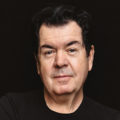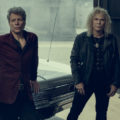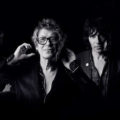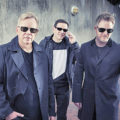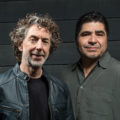“Beds Are Burning” and Midnight Oil will tour no more after “Resist” comes to the Riviera
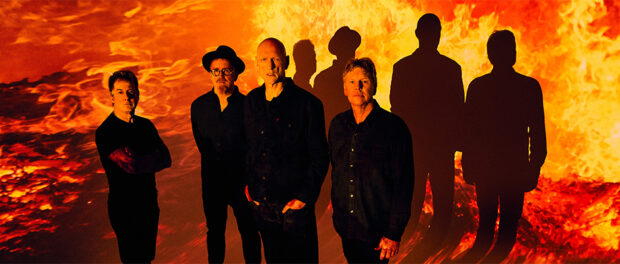 Photo provided by Daniel Boud
Photo provided by Daniel Boud
For a band that’s always boasted the battle cry, “it’s better to die on your feet than live on your knees,” it’s only fitting that Midnight Oil’s farewell to touring is accompanied by “Resist,” a vital batch of fresh alternative rock material emphasizing a slate of enlightened causes and environmental concerns.
Initially fuelled by the international breakthrough “Beds Are Burning” and mounds more of equivalent meaning, Australia’s Midnight Oil may have sold millions of records, but always kept grassroots engagement at the forefront, from stopping New York City traffic in protest of the Exxon oil spill, to promoting statements of social justice to a global audience at the Sydney Olympic Games.
In other words, Midnight Oil could’ve easily been as enormous as U2 had members actively pursued the commercial spotlight instead of shrugging it off, such as the time they skipped the Grammy Awards to honor an already scheduled political event back home.
Nonetheless, original guitarist/keyboardist Jim Moginie promises Chicago Concert Reviews nothing will stop him and fellow lifers Peter Garrett (vocals), Rob Hirst (drums) and Martin Rotsey (guitars) from bidding farewell to the Riviera Theatre with a bang, while reflecting on a life of reluctant stardom amidst the activism.
Why did you decide to release the “Resist” album to go along with this tour? A lot of bands seem to get away with only focusing on the past when it comes to their farewell.
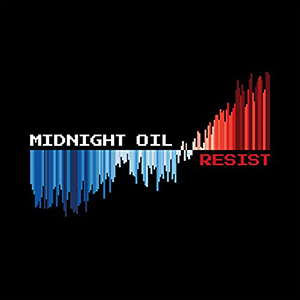 Jim Moginie: We want to go out on top [laughs] with a great new album and all the great, old songs. We didn’t want to make it a nostalgia show. We’re not that sort of people. The way we are as people is quite peculiar. We’re Australian and we grew up with very different music than if we grew up in America. We were listening to Australian bands like The Masters Apprentices, Skyhooks and bands that you would have never heard of, so our influences, apart from some British rock, weren’t so much American. You can kind of tell it’s coming from a different place compared to a modern American rock record for example. It’s a modern Australian rock record. It can’t be really mistaken coming from anywhere else I don’t think.
Jim Moginie: We want to go out on top [laughs] with a great new album and all the great, old songs. We didn’t want to make it a nostalgia show. We’re not that sort of people. The way we are as people is quite peculiar. We’re Australian and we grew up with very different music than if we grew up in America. We were listening to Australian bands like The Masters Apprentices, Skyhooks and bands that you would have never heard of, so our influences, apart from some British rock, weren’t so much American. You can kind of tell it’s coming from a different place compared to a modern American rock record for example. It’s a modern Australian rock record. It can’t be really mistaken coming from anywhere else I don’t think.
We went in the studio and recorded live really. We didn’t spend a long time making it. We were quite prepared with demos and we used quite a bit of the demo sounds that you get by accident to give it a bit of atmosphere, plus the live playing element of eyeballing each other in the room. We worked with our Canadian friend, Warne Livesey, who produced “Diesel And Dust” and “Blue Sky Mining,” probably the more well-known records in the past. He’s a great collaborator and a wonderful sounding board. We just listened to the sound of his recent records to get him back in again cause we really liked what he was doing now: warm, live, full of fire, human blood and flesh (laughs). There’s not much Auto-Tune going on, that’s for sure!
It’s sounding great live and we’re having a ball playing it. We’ve already toured in Australia, so by the time we get to Chicago, we’ll be going pretty well and we’re looking forward to playing. I think we played there last time on my birthday in 2017 at the Vic. We played one of our albums from front to back, an album called “10, 9, 8, 7, 6, 5, 4, 3, 2, 1,” which we do sometimes if we’re feeling like it…I don’t think we’ve played [at the Riviera Theatre] before. I love Chicago. I did the architecture tour there once up and down the river. I’ve been to the Art Institute many times and it’s a great town, so I’m really looking forward to coming back. It will be awesome.
What prompted the decision to retire from the road?
Moginie: I guess we just didn’t want to go out fading into the sunset, playing the songs slower and slower, grasping onto the hand rails of rock. We’ve all seen the older bands coming back and sometimes it’s not so pretty. Sometimes it’s okay, but I think when you’re playing this kind of intense rock music that’s pretty fast, you’re really asking for trouble if you’re heading into your ‘70s. I just don’t think we want it to be any less than it ever was. The fear of that is the reason behind pulling the pin.
Is this really the end or do you reserve the right to change your mind?
Moginie: Yeah, I know. I get three reactions from people about this. I get one, “oh, yeah right, Elton John!” There’s this guy in Australia called Johnny Farnham that’s retired a hundred times and keeps coming back. They say, “oh, Johnny Farnham, yeah right!” Another reaction is, “oh, you guys should’ve stopped ages ago,” which are some of my friends. Great friends I’ve got (laughs). And the other reaction is like, “yeah, I get it. You’ve done your work and you don’t want to be one of those heritage bands playing their hits from 35, 40 years ago” and we all know who they are. The hair starts falling out, you see that the shared vision, perhaps, isn’t there as strongly as when they were young and all pointing in one direction. One of them has got cancer. Another one is rich beyond measure and lives on the Riviera with a supermodel. Another one’s really fat. Another one just doesn’t want to be there, but he doesn’t want to let the others down.
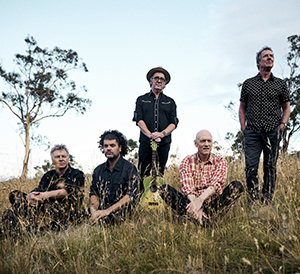
Photo provided by Remi Chauvin
What are hoping to get across with the new music and show?
Moginie: The album is called “Resist,” but there’s a song called “We Resist.” The chorus is, “we resist, it’s a storm without end. Where’s the lighthouse? Where’s a friend? Come to think, it can’t last, only if we resist,” so that’s the sort of message. The only way things get better in the world is if people stand up and fight for it. When you meet the people who are actually on the front lines of things, they’re very brave and will throw their bodies on the line. We’ve been lucky enough to work with a lot of those people over the years and understand where they’re coming from. If you just let things happen and let things slide, nothing’s gonna get better and our music is part of that discussion.
The album is a meditation on the various aspects of various issues. One’s about the Darling River and using all the water in that river to grow cotton in land that’s really not suitable for cotton at all. It’s very arid, there’s not much water and all the water’s being taken for this ridiculous farming. The government’s in on it, selling the water rights for hundreds of millions of dollars. It’s very corrupt! There’s another one about the barrier reef, which is basically being subjected to climate change issues and dying, and another one about global warming generally. There’s another one about a beautiful forest in Tasmania [that’s being used for] copper mining. We’re banging our drums as loud as we can for as long as we can. Hopefully other bands will come after us and take up the mantle.
From the very beginning, Midnight Oil has had something to say. How were you able to pack so much substance into such a steady run of hit singles?
Moginie: It’s funny, we are one of those bands who are like a “message band,” a “political band” I suppose you’d call it, but I don’t think we’ve ever seen anything wrong with it in terms of saying what’s going on in the world. It’s been happening since Billie Holiday sang “Strange Fruit,” Sam Cooke sang “A Change Is Gonna Come,” Gil Scott-Heron sang “The Revolution Will Not Be Televised” and Bob Marley. You might call it protest music or call [Bob] Dylan a protest singer, but we don’t. We like singing about what’s going on in the world, but we’re also wanting to mix it up. Primarily we’re a band of musicians. We know our message can’t be delivered pie-faced playing a “g” chord for 35 minutes, rifling on about corporate culture, corrupt governments, environmental vandalism and all the things that are going on in the world. If we can sing about those things, we want to put them in a really great song that’s poppy, has a great guitar hook and chorus, and gets in and gets out in a few minutes.
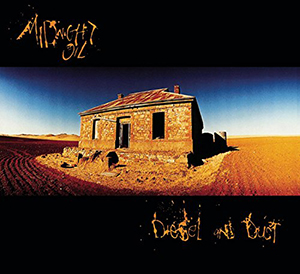 In Australia, we’ve had the Aboriginal land rights issues, which we’ve been fighting for the whole time and that’s been a slow process. In 1967, Aboriginal people didn’t have a vote and then they got the vote, actually, about the same time woman got to vote. It’s quite backwards, and as time’s gone on, various things have happened in history. Now quite a lot of Australia is under native title and people have their own traditional lands to live. That’s been a very slow process and it’s happened politically, socially and with music being part of the soundtrack. People singing along with “Beds Are Burning” because that was pretty much about land rights, even though it might be mistaken for a song about sex cause we put the word “bed” in it. Other musicians [are singing about this] as well. These things are changing, acts that will come with the new government that was elected here. These things happen slowly, so it’s part of that whole evolution of change…
In Australia, we’ve had the Aboriginal land rights issues, which we’ve been fighting for the whole time and that’s been a slow process. In 1967, Aboriginal people didn’t have a vote and then they got the vote, actually, about the same time woman got to vote. It’s quite backwards, and as time’s gone on, various things have happened in history. Now quite a lot of Australia is under native title and people have their own traditional lands to live. That’s been a very slow process and it’s happened politically, socially and with music being part of the soundtrack. People singing along with “Beds Are Burning” because that was pretty much about land rights, even though it might be mistaken for a song about sex cause we put the word “bed” in it. Other musicians [are singing about this] as well. These things are changing, acts that will come with the new government that was elected here. These things happen slowly, so it’s part of that whole evolution of change…
We have a guy in the band, Peter, who actually was a real politician. He went into politics for about ten years for the Australian government and now he’s come out of there. He took Midnight Oil’s message to the absolutely nth degree. It’s a very difficult thing to make that jump from being in a band to being a minister in a government, but he managed to do that and successfully as well. There’s not many guys in bands that would do that. Can you think of any? I can’t. We’re an unusual bunch and we supported Peter totally with what he was doing. We realized he was actually getting his hands on the leaders and changing things. The government he was in wasn’t a particularly good government. It wasn’t just him obviously. You have to be in a caucus with a whole bunch of other people and agree or not agree, and state your case, whatever it is, but it moves forward in that way as a consensus, a bit like a band actually…
I don’t see us being different from Woody Guthrie or Billy Bragg or The Clash. A lot of that music’s been really popular. I mean look at Marvin Gaye’s “What’s Going On.” That was a huge record and it sounded so beautiful, but it was about something and I don’t think there’s anything wrong with it. I don’t know why people shy away from it. I think people should be doing it more. Rock, to me, has become quite sanitized in terms of its message. More of the political discourse has gone into the hip-hop world, slam poets and things like that. It’s not happening in the pop world anymore because I think people are trying to be palatable and acceptable, and trying to be liked. When you hit the “like” button (laughs), that’s a big thing for these people. We came up through the ‘80s and the ‘90s. It’s a different world now…
Speaking of the ‘80s and ‘90s, that’s when Midnight Oil really exploded. What do you remember about that period, particularly relating to your time in America?
Moginie: I remember we were working really hard. Suddenly the band went from an Australian band to being a world band almost overnight. I guess “Beds Are Burning” enabled that rite of passage to occur. We were going to Sweden, the States, Germany, France, Spain, you name it. Suddenly, it was a hyper-accelerated, like we all had drunk Red Bulls and we were going 20 times faster to get from one end of the planet to the other. I’m not quite sure how it occurred, except for we were part of the MTV thing a little bit. We made a few film clips, out there in the Australian landscape usually. Also, people were hungry for some sort of message. I’m not quite sure what happened. It was unusual and we just got really busy.
We played the States a lot. I remember we toured with Bryan Adams, The Tragically Hip and Hothouse Flowers. We brought along an Aboriginal band, Yothu Yindi, and John Trudell, the great Native American poet, and hung out with people like that. Our experience with touring is probably different from other bands. It’s not so much lighting your own farts [on fire], running down the hallway with toilet paper and pestering the hotel guests. [We would] have a cup of tea and talk about serious stuff, but on the other hand, we were a pretty kick ass rock band and that’s really our stock and trade. We were constantly on a bus going from one side of America to the other for many years. I think it was a great experience for us. You learn how to be a band in those situations. It was also quite stressful and difficult, but we had audiences that were hungry to hear us, so it made it all worthwhile.
What was it like reuniting after taking a break throughout the 2000s?
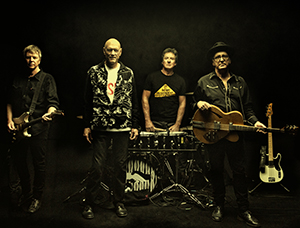
Photo provided by Robert Hambling
When we came back in 2017 to do “The Great Circle” Tour, we realized that there was an audience still there, which was extraordinary. There were people all over the world that remembered the tunes and the live experience of seeing the band, so that was really a shot in the arm. It was quite incredible. I’m still [surprised] that people remembered it, but they did…I guess we’re coming back [again] with unfinished business. We’ve got songs to play, ideas to share with people and a new album that we’re really proud of. We’re looking to share that and say goodbye to people really in a way that’s respectful. They’re a part of the band more than we are in a way. They were there in the beginning and they are there now. It’s that DNA that you share with your audience. There might be some sadness. Hopefully there will be some joy and we go out with a bang.
Are there any moments you will never forget from a life spent in Midnight Oil?
Moginie: One of the things I think about is the Exxon Valdez protest we did on Fifth Avenue in New York. We set up a stage in front of the Exxon building and basically faced the stage right at the building and played a bunch of songs about the environment. That was turned into a film and was an amazing experience. The cops let us play about eight or nine songs before they shut us down. The whole avenue was crowded with people. There were tens of thousands of people listening to us. Another time would be playing the Sydney Olympics in the year 2000 and coming on stage with “sorry” shirts, which was a protest against the government basically snubbing First Nations people, so we made our own apology and wrote it on our clothes. That was an incredible experience cause the plug went to millions and millions of people around the world.
Others were quiet nights with the stars coming up in the Australian desert playing to small Aboriginal communities with a bunch of gear we set up in the back of the truck. You can’t even see the people. You just see their fires, the dogs and people kind of gathering around those a distance from the stage because it’s too loud and too frightful (laughs). The band became better as people from those experiences and learning from Aboriginal people. We probably wouldn’t have ever done that if we had normal jobs. Being exposed to those things and just hearing the language, the music and learning from their culture [was very meaningful]. We have a lot to learn and they have a lot to teach us.
Then other times, sharing stages with great bands and seeing them play, wherever they might have been back in the day. And times in the back of the bus you share as people in a band. Sometimes it’s difficult and sometimes you’re screaming for the toilet, or the van gets lost and you just want to go to sleep. Touring can be quite hard sometimes, but it’s such a great thing to create by doing what we did and how we did it. I don’t know where to even start!
Midnight Oil performs at the Riviera Theatre on Friday, June 10. For additional details, visit MidnightOil.com and JamUSA.com.


